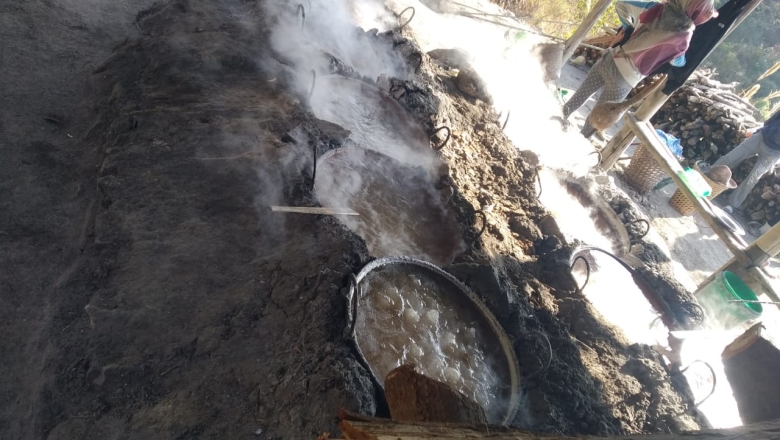When the majority of the world population has been facing untold miseries and normal lives are thrown out of gear due to the prolonged Coronavirus pandemic, a small Tangkhul village in the remote northern part of Manipur’s Ukhrul district has a different story to tell. The villagers of Marangphung have managed to neutralise the impact of the COVID-19 outbreak by utilising available resources to the fullest.
Situated about 61 km away from Ukhrul district headquarter, the village with around 50 households is poised to go "all organic" and market their products with a difference, perhaps far from the huge profit-making practice that uses harmful chemicals in crop cultivation to reap maximum benefits.
This beautiful hilly village is suitable for growing varieties of fruits and vegetables. Guava, sugarcane, banana and yongchak (tree bean) among others are found in abundance here. And, they are purely organic.
Apart from the rich vegetation and beauty of the place, the villagers enjoy uninterrupted water supply throughout the seasons, which makes their lives a lot easier. All these positive factors enable them to carry out agricultural activities and help sustain their livelihoods.
The village is also endowed with a salt lake, which the villagers proudly claim as nature's "best gift" to them as it produces edible salt. They follow the traditional knowledge system to process the salt. The salt production has helped them tide over the tough time amid the pandemic which witnessed a wave of returnees from outside the state to their native place. Perhaps, their prudent way of living by investing if not saving for rainy days does the trick and it surely has been their biggest takeaway.
The locals believe the salt from the lake contains many health benefits and they have been religiously using this product to stay healthy and free from ailments. Till date, there have been no reports of health-related problems, they claim.
When the Imphal Free Press asked about the financial aspect of engaging in traditional salt making and its role in facing the global pandemic, a visibly beaming resident said, "This locally found resource has been an "elixir of life" for us and has helped us faced the nationwide lockdown with lesser impacts as we had reserved some amount for unforeseen events."

Preparation of salt in progress (PHOTO: IFP)
This locally processed indigenous salt product is in high demand ever since the news spread to the outside world. And if the salt production is tapped well and marketed properly, it will bring rich dividends for the village. Neighbouring villagers and even people from the extreme corners of the state, including Mao and Poumai villagers frequent the place to get the salt locally produced here. They say its special and unique taste make them go for more.
Many people use the "filter saltwater" to treat several health ailments, including sinus and gastric problems. Interestingly, many households in the town also use this locally made salt as an additive to make green vegetable dish looks greener. Because of its many uses and its health benefits, the demand for the salt from Marangphung has increased thanks to its long-lasting unique taste.
The local process of making the salt involves plenty of time, energy and labour to obtain the final product. And the price of the salt depends on its quality. A bowl of average standard salt is sold at Rs 300 while more refined ones are sold at Rs 500 and above. The filter saltwater is sold for 150 a bottle.
Villagers work on a rotational basis. And in a given year each household spent at least 20 working days in the lake preparing the salt. During sowing season, as most of them are engaged in agricultural activities, few people go for salt making trip.
In a year, each household earns at least Rs 35,000. Those who are engaged full time in making the salt could earn Rs 1 lakh and above.
Commenting on the concerns of the villagers, Marangphung village headman SA Ramnganing told the Imphal Free Press that lack of proper equipment or "poor facilities" such as proper drainage system, buildings, boiling pots and others have seriously impacted the production level.
The villagers believe that the provision of basic facilities and infrastructure could enable them to emerge as "self-reliant citizens", thus reducing the burden on government dependency.
In view of it, Ramgnaning urged Chief Minister N Biren Singh-led state government to provide these basic requirements needed for the smooth production of salt and enable these far-flung villagers to reap maximum benefits, which will further help to enhance their standard of living.
The village chief expressed the hope the chief minister would lend his ears and translate these genuine concerns into actions
Recently, a team of scientists visited the salt lake site for sample collection to examine and determine the salt quality.
When the IFP correspondent visited the salt lake site it was found that trees in and around the lake were cut down extensively. The traditional and indigenous method of making the salt require "huge amount of firewood", thus directly causing deforestation and affecting the environment. An alternative arrangement is much urgently needed to replace the use of firewood and mitigate its impact on the environment.
ALSO READ: